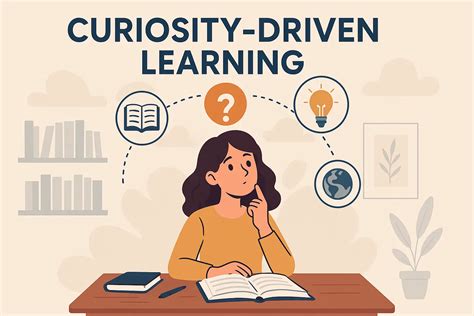Why Curiosity is Essential for Lifelong Learning

In today’s rapidly changing world, the ability to learn continuously is not just a skill—it’s a necessity. Technology, society, and industries evolve at an unprecedented pace, and those who can adapt by acquiring new knowledge and skills have a distinct advantage. But what drives this ongoing process of learning? One of the most fundamental and often overlooked catalysts for lifelong learning is curiosity. Curiosity fuels our desire to explore the unknown, challenge assumptions, and expand our horizons. It’s the spark that makes learning an exciting, personal, and rewarding journey rather than a mere obligation.
Curiosity Fosters a Growth Mindset
Curiosity is closely tied to the concept of a growth mindset—the belief that abilities and intelligence can be developed through effort, perseverance, and learning. When we’re curious, we’re less likely to see failure as a setback, and more likely to view challenges as opportunities to learn and grow. This mindset is essential for lifelong learning because it keeps us engaged with the process, even when we encounter obstacles or setbacks.
A curious learner approaches problems with an open mind and a willingness to experiment. Instead of being intimidated by unfamiliar topics, they ask questions, seek out resources, and embrace the discomfort of the unknown. This approach builds resilience, which is key to overcoming the inevitable struggles that come with acquiring new knowledge.
Curiosity Encourages Active Learning
Curiosity is not just about passively receiving information—it’s about actively seeking answers and understanding. When we are curious, we engage in the process of discovery, asking questions, and seeking deeper insights. This leads to a more engaged and meaningful learning experience. Active learning, driven by curiosity, involves critical thinking, problem-solving, and applying knowledge in real-world contexts.
Curious individuals are more likely to seek out new experiences, engage with diverse perspectives, and explore ideas outside of their comfort zones. This proactive attitude makes learning more dynamic and relevant. Whether it’s through reading, asking questions, participating in discussions, or experimenting with new concepts, curiosity compels us to stay engaged and continually refine our understanding.
Curiosity Promotes Lifelong Intellectual Independence
As children, we are often guided by teachers, mentors, and other authority figures in our learning. However, as we grow older, the responsibility for learning shifts to us. Curiosity plays a vital role in helping us become independent learners, enabling us to explore subjects and areas of interest without needing constant guidance.
When curiosity is nurtured, it encourages a sense of ownership over one’s learning journey. People who are curious are not satisfied with surface-level knowledge; they seek to understand the “why” and the “how” behind things. This intellectual independence allows us to continue learning throughout our lives, regardless of formal education or external pressure. Instead of waiting for instructions or relying on external motivation, curious individuals take charge of their own intellectual development.
Curiosity Helps Us Stay Adaptable
In an era defined by rapid technological advancements, economic shifts, and global changes, adaptability is crucial. Those who are curious are naturally more adaptable because they are continually seeking new knowledge and adjusting their understanding in response to new information.
Curiosity encourages us to question the status quo, explore different perspectives, and consider alternatives to traditional ways of thinking. This ability to think critically and remain open to new ideas helps us navigate uncertain or rapidly changing environments. In a workplace context, for instance, employees who are curious are better able to acquire new skills, understand emerging trends, and stay ahead of industry changes.
Curiosity Stimulates Creativity and Innovation
Curiosity is a driving force behind creativity and innovation. When we are curious, we are more likely to connect seemingly unrelated ideas, think outside the box, and come up with novel solutions to problems. This is especially important in an age where innovation is the key to success in many fields.
Curiosity pushes us to explore different disciplines, leading to interdisciplinary knowledge that can spark creative insights. For instance, a curious mind might draw inspiration from art to solve a problem in engineering or use insights from psychology to enhance user experience in technology design. By fostering a culture of curiosity, we can create environments where new ideas flourish and innovation thrives.
Curiosity Enhances Personal Fulfillment
At its core, curiosity is driven by a desire to understand the world around us and find meaning in our experiences. When we cultivate curiosity, we open ourselves to a lifetime of exploration, which can lead to greater personal fulfillment. The act of learning—whether it’s discovering a new language, exploring the depths of history, or experimenting with new hobbies—can be immensely rewarding.
Moreover, curiosity keeps the mind sharp and engaged, which is important for mental well-being as we age. Engaging in lifelong learning through curious exploration can stave off feelings of stagnation and boredom, offering a sense of purpose and excitement.
Curiosity Makes Learning a Habit
The more we satisfy our curiosity, the more we cultivate a habit of learning. As we experience the satisfaction that comes from uncovering new information or solving complex problems, we become more motivated to keep learning. This creates a positive feedback loop—curiosity leads to learning, and learning sparks more curiosity. Over time, this cycle transforms learning from a sporadic activity into a lifelong habit.
When learning becomes a habit driven by curiosity, it becomes an intrinsic part of who we are. It’s not about checking off a list of tasks or meeting external requirements; it’s about the joy of discovery and personal growth. Lifelong learners are those who have internalized the idea that learning is a continuous and self-directed process.